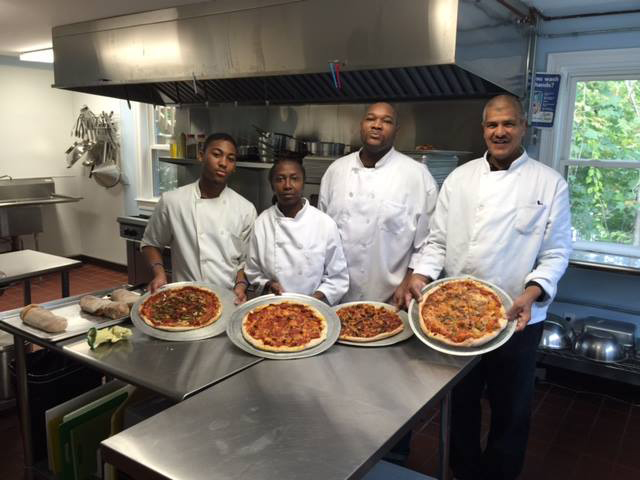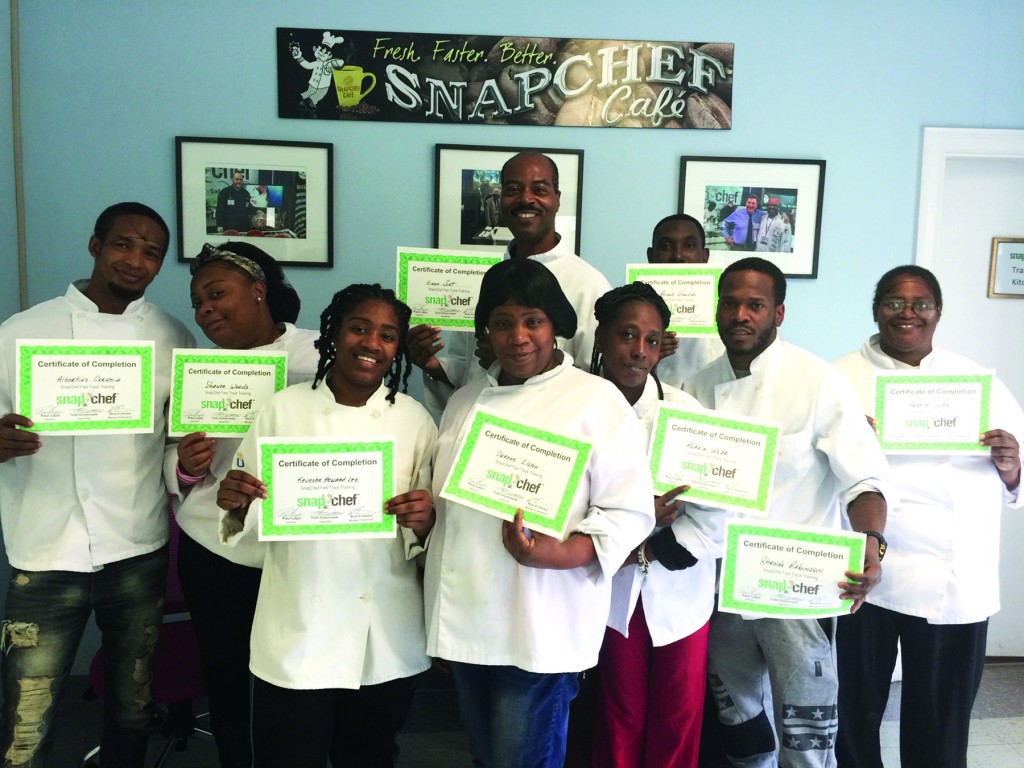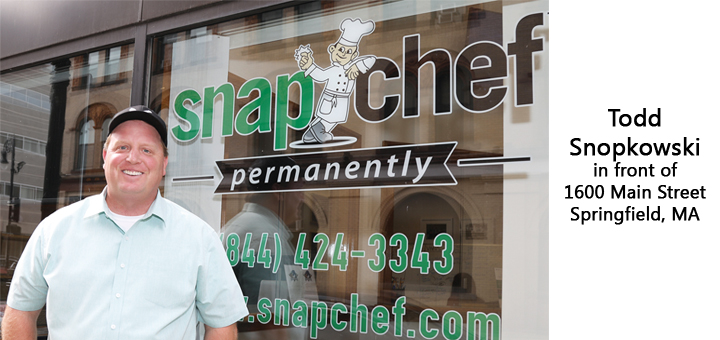—–By Frederick A. Hurst—–


When I first listened to Todd Snopkowski at a group meeting describing “Snapchef,” the business he opened in 2002 to provide employment and training to those wanting a career in the food service business, I didn’t quite understand what he was saying to me but it sounded like a very good thing, which is why I set up a second session with him for a deeper one-on-one discussion. In the interim, I visited the Snapchef website. According to its website description, “Snapchef is the largest culinary training and staffing company in New England, providing staffing for food service establishments of any size throughout the region.” It seemed simple enough. According to my dictionary, “culinary” is defined as “of or for cooking or the kitchen.” So, as a lay person with minimal familiarity with the culinary industry, I concluded that Snapchef was some version of a day labor company that provided temporary staffing to businesses that were involved with food preparation. But it is much more. The website also stated that Snapchef offers “a comprehensive range of food service and hospitality training and consulting services” and that their “clients include major universities, hospitals, five-star hotels, major food service corporations, caterers, corporate cafeterias, restaurants and more.” What that part of the description said to me was that Snapchef is much bigger than a temp service but my laymen’s limitations still left me puzzled. I still couldn’t wrap my mind ar


ound what the 15-year-old business was all about and what moved Todd to recently expand it from Boston to Springfield. What I learned from subsequent discussions with Todd Snopkowski is that Todd is an innovator and a visionary who conceived of an idea for providing a comprehensive set of services for the food service industry in a format that has never before been tried. The idea for Snapchef came from Todd’s own extensive experience in the food service industry during which time he was given the opportunity to develop from the simplest job in food service of washing dishes to eventually becoming a master chef. One day it occurred to him that his unique experience could be applied for the benefit of the food service industry and for the benefit of disadvantaged folks who might want a career in the industry and he developed a model that responded to the needs of both. Todd was born in 1968 in upstate New York in the small town of North Tonawanda between Buffalo and Niagara Falls where his parents were born and raised. He graduated from North Tonawanda Senior High School and afterwards earned a degree in Culinary Arts at Niagara County Community College while working 70 hours a week at Santa Lucia’s restaurant in Amherst, New York where he started out washing dishes. Santa Lucia’s was a 46 seat, “quality” restaurant owned and operated by a husband and wife couple who mentored Todd for seven years in every aspect of the restaurant business “from kitchen work to greeting customers in a tuxedo.” When Santa Lucia was sold, Todd took a job for four years at a Turgeon restaurant in Buffalo called “Sign of the Steer.” Sign of the Steer was owned by brothers Ralph and Frank Turgeon who, at the time of Frank’s recent death, owned 22 restaurants and four hotels. The brothers were famous for their “unusual steak house and salad bar operations in multiple themed restaurants.” Todd remained at Sign of the Steer for four years as kitchen manager working 80 hours a week running two kitchens and supervising cooks twice his age from whom he learned much more about the culinary business. Sign of the Steer also ran a high volume butchering operation which allowed Todd to develop and refine his butchering skills. It was also where Todd first worked with “temp” agencies and their employees. In 1992, Todd left Sign of the Steer and went to work for “Aramark” where he remained for nine years and was presented with a special set of rare opportunities. Aramark grew out of a business started in Los Angeles in 1936 by Davre Davidson selling peanuts out of his 1932 Dodge. By 1945, Davre and his brother Henry were operating Davidson Brothers, one of the largest vending companies in California. In 1959 the company merged with another vending company under a new name, Automatic Retailers of America. In 1961, the new company purchased a large food service business and moved the headquarters to Philadelphia. By the time the company changed its name to Aramark in 2009, its businesses had expanded to the United Kingdom, France, Belgium, Germany, Czechoslovakia, Hungary, South Korea and Ireland and was providing a range of food and related services to a vast variety of venues including the Olympic Games, first in Mexico in 1968 and for every Olympics thereafter. As part of its ongoing community service, Aramark also assembled a team to provide food to 25,000 displaced victims of Hurricane Katrina and, for 68 days it delivered a constant supply of nutritional vacuum-sealed meals through a narrow tube a half mile into the earth to the 33 trapped miners in Chile. Aramark gave Todd his expansive view of the food service business. He started at Aramark as a grill cook in Williamsville, New York, which was somewhat of a backward step but he became an expert at it and today teaches grill cooking as a specialty. Eventually, through the assistance of Aramark’s human resources director, Todd was selected to be a “sous-chef” at the Olympic Games, a prestigious role that placed him second in command to the top chef and gave him exposure to some of the greatest chefs from around the world. Todd also worked for Aramark as a sous-chef at Boston University for two years and as executive chef at Aramark’s largest client, AT&T’s world headquarters in Baskin, New Jersey, serving 5,000 employees. Todd finally became Aramark’s New England regional chef for about six months followed by a mountain bike accident that shattered his clavicle. It was while he was healing on medical leave with plenty of time to reflect that Todd decided to start Snapchef with his Brazilian wife, Daniela, whom he had met during his last year at Aramark where she also worked on a student visa. While working at Aramark Todd regularly hired day laborers provided by multiple “temp” agencies and discovered that most were woefully undertrained or untrained. He realized that the agencies simply sent the first laborers who volunteered and gave no consideration to their level of training or the need for training. The laborers were hired for the day, worked for the day and were paid for the day as part of a temp system that might have worked for other industries but was clearly inadequate for the food service business, Todd observed. Todd also observed that most of the temp workers came from poorer inner city neighborhoods and had few career opportunities which is why Todd and his wife decided to develop a program that would prepare people for work in the culinary industry that would make a social difference and that would incorporate day laborers but would be far more comprehensive, which is why most Snapchef trainees are recruited from inner city neighborhoods where Snapchef facilities are located in Worcester, Massachusetts, Rhode Island, Dorchester in Boston, Massachusetts and most recently, as of April, 2017, at 1600 Main Street in Springfield, Massachusetts. Training and career development are at the core of Snapchef’s business. Snapchef recruits workers whose aspirations range from day labor in the culinary field to long-term careers. Unlike clients in the regular day labor industry, all Snapchef workers receive the appropriate level of training before being assigned to work anywhere at any level and they are all paid at minimum wage or above and share benefits. The level of training is geared to the level of work and the trainees’ career aspirations. All trainees undergo an evaluation to determine their level of culinary skill. The evaluation includes written and hands-on tests followed by an orientation after which they are given an assignment based on their levels of skill. Some trainees only want day labor and nothing more. They are vetted, trained and assigned to Snapchef clients as trained day laborers. Other 

“Todd foresaw not just a solution to the acute shortage of trained temporary kitchen staff across the food service industry. He saw the opportunity to change lives – and change communities. Snapchef was not to be just an employment agency. Snapchef would be a holistic organization with a mission – dedicated to positive social impact by celebrating food as art and personal expression, sustenance, workforce development and community building.”


Snapchef has come a long way but it has much farther to go. No doubt, in time, Todd and his wife, Daniela, Snapchef’s cofounder and Chief Financial Officer with a degree in business administration who was recently named to Boston Business Journal’s 2017 “40 under 40” list, and Snapchef’s incredible management staff (which I hope to highlight in a future article) will take the business to the highest levels in the coming years. ■








